

Evaluating Journal Articles - Evaluating Sources - Research Guides at Benedictine University Library.
COLLECTION: Data Literacy. COLLECTION: Digital Citizenship. COLLECTION: Media Literacy and Fake News. S.O.S. for Information Literacy. Framework for 21st Century Learning. The Essential Fluencies. The Essential Fluencies The Essential Fluencies of innovative learning are structured processes for developing the skills that your students need to succeed, today and in the future.
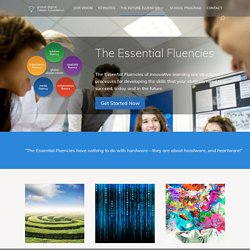
Get Started Now “The Essential Fluencies have nothing to do with hardware—they are about headware, and heartware!” Solution Fluency Develop problem-solving superpowers Learn More Information Fluency Learn Sherlock-style data skills Learn More Creativity Fluency Unleash your inner Picasso Learn More Media Fluency Be the next Spielberg Learn More Collaboration Fluency Bring together unstoppable teams Learn More Global Digital Citizenship Be global, and be great Learn More Discover Wabisabi, a whole new way to love the school day.
Get Started for Free Pin It on Pinterest 236 Shares Share This. The NCTE Definition of 21st Century Literacies. Updated February 2013Adopted by the NCTE Executive Committee, February 15, 2008 Literacy has always been a collection of cultural and communicative practices shared among members of particular groups.
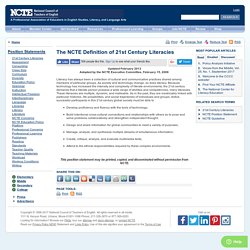
As society and technology change, so does literacy. Because technology has increased the intensity and complexity of literate environments, the 21st century demands that a literate person possess a wide range of abilities and competencies, many literacies. These literacies are multiple, dynamic, and malleable. As in the past, they are inextricably linked with particular histories, life possibilities, and social trajectories of individuals and groups.
This position statement may be printed, copied, and disseminated without permission from NCTE. More Thoughts on 21st Century Literacies. Extended interviews with educators on the meaning of "21st century literacies," recommendations for using new technologies, and ideas for updating lesson plans to support 21st century learning.
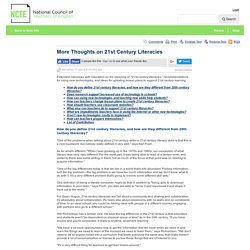
How do you define 21st century literacies, and how are they different from 20th century literacies? "One of the problems when talking about 21st century skills or 21st century literacy skills is that this is a nice buzzword, but nobody really defines it very well," says Karl Fisch. As for what's different: "When I was growing up in the 1970s and 1980s, our conception of what literacy was very, very different. For the most part, it was being able to read at a certain level, and certainly there was some writing in there, but so much of the focus at that point was on reading to acquire information. " "One of the big differences today is that we live in a world that's info-abundant. Will Richardson has a similar view.
"It's a very difficult thing for teachers to get their brains around. " Contributors. The Other 21st Century Skills. Many have attempted to identify the skills important for a learner today in this era of the 21st century (I know it is an overused phrase).
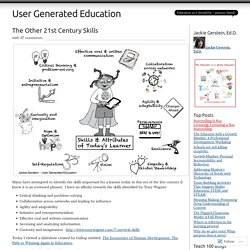
I have an affinity towards the skills identified by Tony Wagner: Critical thinking and problem-solvingCollaboration across networks and leading by influenceAgility and adaptabilityInitiative and entrepreneurialismEffective oral and written communicationAccessing and analyzing informationCuriosity and imagination Today I viewed a slideshow created by Gallup entitled, The Economics of Human Development: The Path to Winning Again in Education. Here are some slides from this presentation. This presentation sparked my thinking about what other skills and attributes would serve the learners (of all ages) in this era of learning.
PerseveranceResilienceHope and OptimismVisionSelf-RegulationEmpathy and Global Stewardship Perseverance Students can develop psychological resources that promote grit, tenacity, and perseverance. Resources for Educators: Resilience. What Every SLMS Should Know about Teaching Multiple Literacies Strategies. Reading Across a Dozen Literacies. This article will define each literacy while giving examples of "reading" within each category.
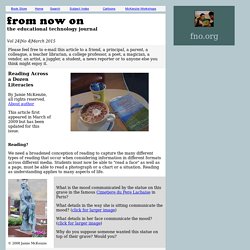
It takes special skills to read a swamp or a beach or a desert area. These skills also differ from region to region as the flora and fauna shift. Most of us have heard of swimmers caught in rip tides because they did not know how to read the signs or of visitors enjoying tidal flats suddenly swept up in an incoming tide much larger than anything they knew back home.